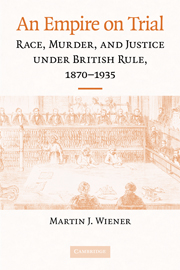Book contents
- Frontmatter
- Contents
- Preface
- Acknowledgments
- AN EMPIRE ON TRIAL
- Introduction
- 1 On the High Seas
- 2 Queensland, 1869–1889
- 3 Fiji, 1875–1885
- 4 Trinidad and the Bahamas, 1886–1897
- 5 India: The Setting
- 6 India: In the Legal Arena, 1889–1922
- 7 Kenya, 1905–1934
- 8 British Honduras, 1934
- Conclusion
- Bibliography
- Index
4 - Trinidad and the Bahamas, 1886–1897
Published online by Cambridge University Press: 05 June 2012
- Frontmatter
- Contents
- Preface
- Acknowledgments
- AN EMPIRE ON TRIAL
- Introduction
- 1 On the High Seas
- 2 Queensland, 1869–1889
- 3 Fiji, 1875–1885
- 4 Trinidad and the Bahamas, 1886–1897
- 5 India: The Setting
- 6 India: In the Legal Arena, 1889–1922
- 7 Kenya, 1905–1934
- 8 British Honduras, 1934
- Conclusion
- Bibliography
- Index
Summary
All you who have ears to hear and brain to understand,
Come listen to Judge Gorrie's praises the wisest in the land,
He likes the poor to get their right, the rich he does not fear;
He is the greatest blessing of this great Jubilee year.
First stanza of Trinidad street ballad, 1888The exaction of excessive bail by Cook J. was contrary to the Bill of Rights, but the defendants Gorrie and Cook actually pleaded in their defence that “The Bill of Rights did not apply to the Islands of Trinidad or Tobago.”
Hugh H. L. Bellot, “A Judicial Scandal: Are Judges Above the Law?” Westminster Review, 1896A CHIEF JUSTICE GOES TOO FAR
On a Sunday evening in 1888, on the outskirts of Nassau, the capital of the British colony of the Bahamas, a black fisherman named Shadrach Gay was set upon in the street by five men, four of them white, one “colored.” They knocked him about, tore his clothes, and insulted a woman accompanying him. Then some fishermen friends of Gay came to his assistance, and in the melee Gay pulled off his belt and struck one of his assailants, Jeff De Pain, on the head with it. De Pain thereupon took out a razor and slashed Gay in the stomach, inflicting a wound of which he died in a few hours.
- Type
- Chapter
- Information
- An Empire on TrialRace, Murder, and Justice under British Rule, 1870–1935, pp. 95 - 127Publisher: Cambridge University PressPrint publication year: 2008



